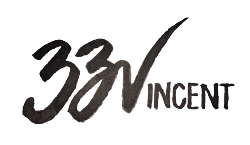Boost Your Performance by Diving Into Deep Work
Have you ever felt like you just can't focus? Or that you just don't feel as productive as you should be? There's a solution—and it's called deep work. This simple concept can help you get more done, perform better, improve your job satisfaction, and even help you achieve work-life balance! It might sound too good to be true, but we at 33Vincent use this method every day.
This primer will summarize the ideas behind deep work, explain its benefits, and provide a quick guide so you can start using deep work today!
What is Deep Work?
“Deep Work" was coined by Cal Newport in his famous book, “Deep Work: Rules for Focused Success in a Distracted World.” It explains how to use long periods of focus without distraction to improve productivity and quality of work.
There’s been a lot of hype in recent years about this concept, with the book quickly becoming a Wall Street Journal Bestseller—and that’s because it works.
This method of work simply increases our ability to concentrate on important, cognitively demanding tasks, thereby producing better results. It is often utilized as an antidote to the distractions of the modern workplace—email, meetings, Slack, social media, text messages, etc. These distractions cause people to spend large portions of their day switching context, thus reducing the ability to produce high-quality or high-value work.
Context switching is also called “Invisible Multitasking,” and it’s one of the top 3 productivity mistakes our Executive Assistants watch out for!
Why Should I Be Using Deep Work?
Achieving More With Less Time
Without having constant pings or multiple tasks causing you to switch context in your brain, you’ll be more productive and achieve more in a shorter amount of time.Performance Improvement
Science shows multitasking destroys our performance. Because you’ll be more deeply focused on the task at hand, not only will your productivity increase—you’ll also be utilizing your full attention. That means better ideas, higher quality work, and fewer mistakes! The overall quality of your work will drastically improve.Increased Job Satisfaction
When work quality improves, studies show you’ll find more fulfillment in what you do. Working this way will also allow for you to become a master at what you do, therefore progressing in your field, leading to more fulfillment and satisfaction. What a positive snowball effect!Better Work/Life Balance
When you’re able to achieve more in less time and produce higher quality work, it’s unlikely that you’ll need to pull late nights or early mornings to complete your work. By focusing on work and getting the job done during your set hours, you can close up your computer at the end of the day, knowing that you completed the task at hand, and being able to fully enjoy your personal life outside of work.
Who Uses Deep Work?
Many high-powered business leaders and CEOs utilized this method before it gained notoriety from Cal Newport’s book. But if you don’t want to take our word for it, here are some examples of successful people who have utilized this concept:
Tim Cook: The Apple CEO starts his workday before 4 am. When asked why in an interview, he said that the early morning is free of distractions, and therefore this time helps him plan his work strategies.
Bill Gates: The founder of Microsoft has a large chunk of deep work twice a year, spent alone in a cabin, that he calls “think week.” He remains completely disconnected from family, friends, and work, and spends the time reading and thinking. During one of his “think weeks,” he came up with the plan for Microsoft Tablet P.C.
J.K. Rowling: This author removed digital distractions when she completed her most well-known work. She disappeared completely from social media when she wrote the Harry Potter series.
How to Start Using a Deep Work Schedule
As you start using deep work, you’ll want to test what works for you. There are many different ways to implement this method, and it’ll take some time to find the groove that’s right for you. Just like becoming physically fit is a process, focusing for long periods of time is a process too. It can be difficult at first, but your ability to focus without distraction will increase over time just like working out a muscle.
Approach deep work like you would training for a race. Here, we’ll start with a very basic “crawl-walk-run” type approach, where you start by making small changes, and work your way up to making it a regular part of your life.
Set Aside Time Specifically for Deep Work
Block time on your calendar to try deep work. Whether it’s one large chunk of several hours during a single day, or a few smaller chunks throughout the week, it’s important to consciously set aside time like you would for a meeting.
It helps to choose a time when you’re at your peak performance—if you’re a morning person, early morning hours are great. If you don’t hit your stride until after a few cups of coffee, mid-morning might be best. Whichever you choose, be sure to block it off and stick to it!Remove Distractions
We’re all prone to distractions, whether that’s pings from Slack, text messages from your family, or a child pulling at your legs. When you set aside time for this method, also plan to remove distractions.For some, that might mean removing physical distractions by isolating themselves in a meeting room or office with a closed door, while others might prefer a change of scenery like a coffee shop. The largest distraction will probably come from the digital realm in the form of alerts from texts, emails, messaging apps or social media.
While you can, of course, shut down these digital distractions on your own, some of us need a little help. There are a variety of apps, plugins, and tools you can use to remove distractions. We love Freedom, which blocks distracting apps and websites across all devices.Determine What You’re Going to Work On
Now that you’ve set aside time and removed distractions, choose a project or task to work on. Don’t waste that valuable deep work time trying to find a task!We suggest choosing a complex or thought-driven task that will provide high-value to your job and your organization, as this type of work will benefit most from your concentrated focus. It also helps to keep in mind that many tasks are also small projects. You want to keep your context switching (aka invisible multitasking) to a minimum, so try to focus on only one task at a time. For more on invisible multitasking, read #3 here.
Try a Deep Work Session or Two and Evaluate
Were you able to truly focus? Do you need to change your environment or eliminate more distractions? Did you have enough time? Was there too much time and you started to fade out? Make adjustments to your next session and continue until you find your optimum deep work practice, and can make it a regular part of your work life. Again, becoming “fit” in this area is a process, and as you practice more and more, you’ll find the system that works best for you.
Examples of Tasks Great for Deep Work
Here are some tasks that require intense concentration that you might consider focusing on when you set aside time for deep work. Note this list is not exhaustive, and this method can be used for any task that requires focus!
Business Planning
Research
Writing (presentations, articles, blog posts, reports, etc.) - the “deep work” concept was even used when writing this blog!
Creating courses
Preparing for an important meeting
Data analysis
Go Head, Dive on In—The Water’s Productive!
Do you want to try out this productive method, but don’t have the large blocks of time necessary to fit it into your schedule? Our Executive Assistants are pros at freeing up time in schedules—and the even utilize deep work themselves!
If you’re having trouble utilizing this method or find the time to do so - Let’s talk! We’re always here to help.
33Vincent has many other resources to help you maximize your time and communication with your executive assistant.



